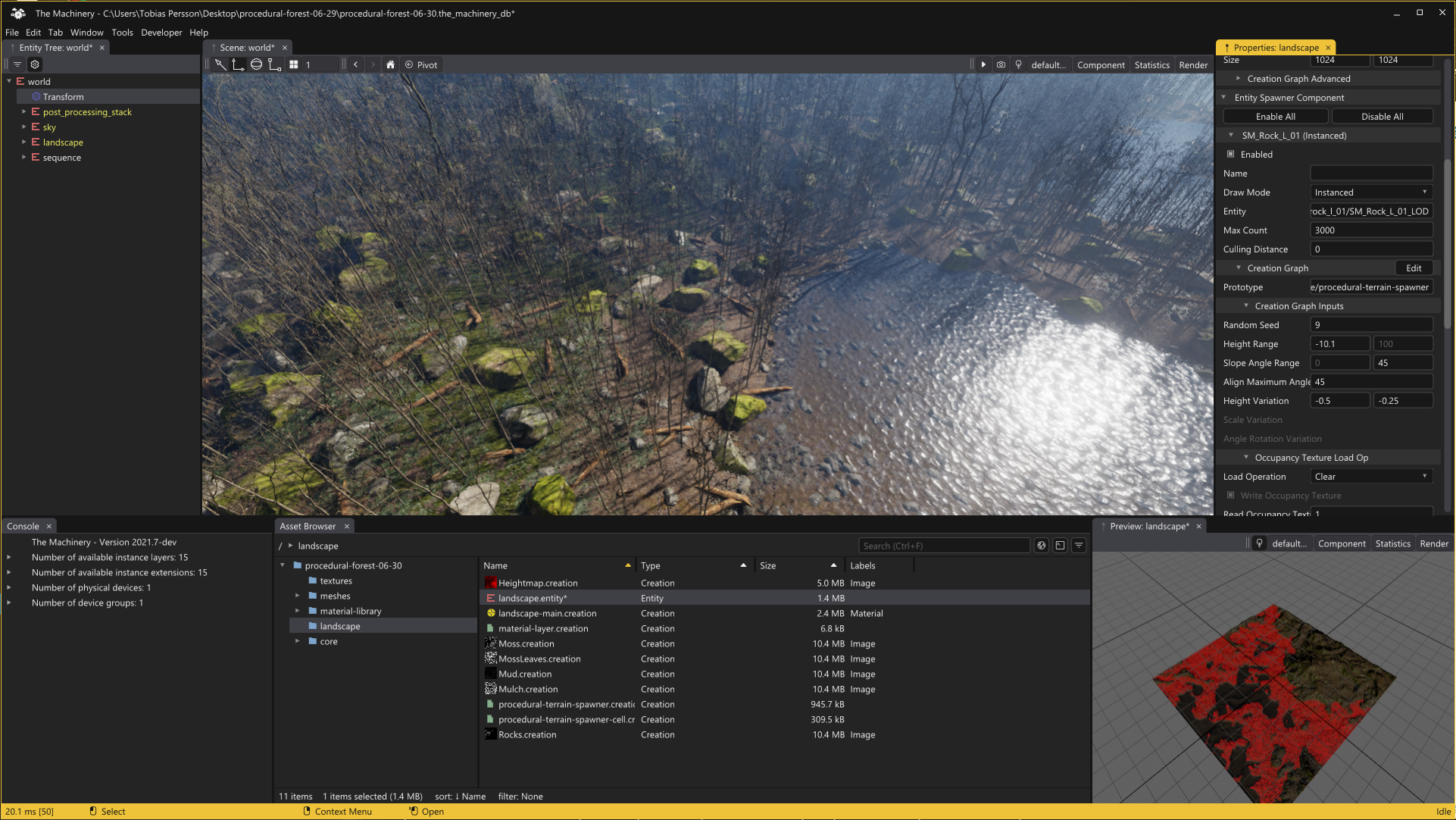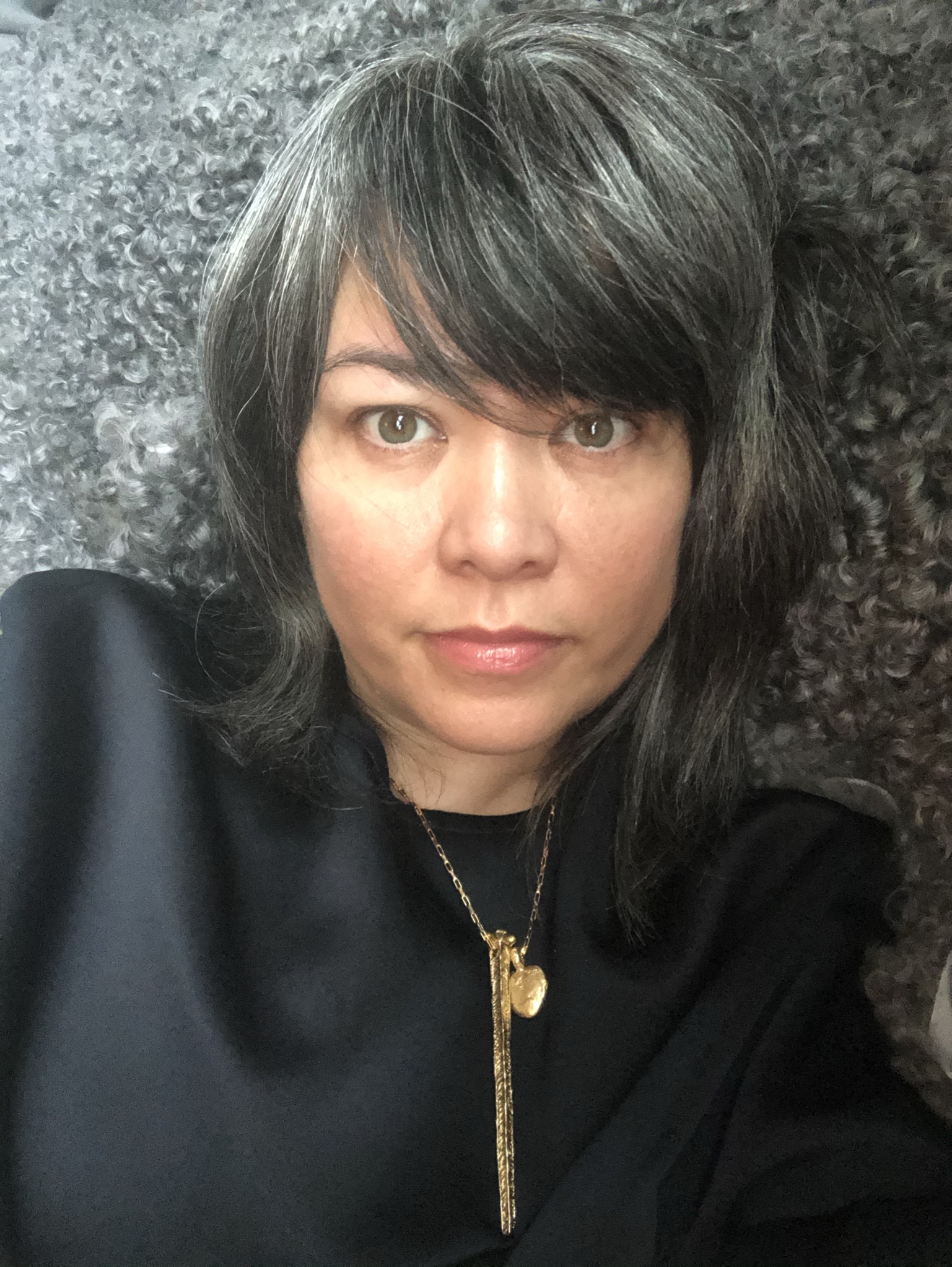Why the games industry needs a new engine
The Machinery takes a radically different approach to what's already out there.

Game engines: everything runs on them, barely anyone outside of developers really know what they're all about. The founders of Our Machinery, however, have multiple decades of experience of working on the biggest engines in the world, including the likes of Unity and Amazon's Lumberyard, before realising there was a need for another, different approach.
Our Machinery's big idea is an engine called The Machinery, which is an engine built on a new 'plugin' concept. The core idea is that, where developers currently either build their own in-house engines or license one and spend ages rewriting it, The Machinery's absolute core is customisability, with a 'standard' set of plugins and the ability to take developer-authored plugins.
PC Gamer sat down via Zoom with two of the three co-founders, Niklas and Tricia Gray, a married couple whose very cute baby didn't seem too interested in the engine chat. We spoke about what makes The Machinery different, the way the industry's changed in recent times, and why they don't want to be a huge, crazy conglomerate.

PC Gamer: I'd like to start with that recent news about eFootball moving to Unreal Engine, which suggests Konami's largely done with its own in-house Fox Engine. Do you think this shows that the more traditional idea that companies build their own engines is going the way of the dinosaurs?
Tricia Gray: It really is. You know when Derek and I worked at [Star Trek Online developer] Cryptic, they had their own engine, and people just have, they just start building internal engines, and it becomes this monolithic conglomerate of thousands of lines of code, and it just becomes too big and overwhelming. And then when you try to fix old parts of it, like it blows up another part of the engine. One of the things I saw when I was working at all these engine companies like Unity and Epic and everything, is that people are kind of over monolithic and huge engines that are specific to certain things, and they can't move. Like Cryptic's engine was mostly built for MMOs and stuff, so if they wanted to do a first-person shooter, it's kind of hard to like, switch back, you have to build all this other stuff to go on top of that code, and that code gets heavy.
So part of The Machinery is that it's modular, so someone like Konami can take it and be like, okay, here's all the parts that we like about our old engine or components that we need, and we'll just slip it into the base that we have for The Machinery. We don't need this feature, or we don't want their editor, but we want this and that, and they can kind of plug it in and make it lighter.
Niklas Gray: Yeah, I think it's kind of a tricky proposition for for any company now to start building a custom engine because because it's a big overhead, like you don't even know what you're gonna have for two years, or whatever. So I think what's happening, they reach a point maybe where they're too complex to continue to maintain. And then they sort of shut down, but there's fewer new customers being created: I think that's sort of what's causing the trend of custom engines disappearing. But we love the customizability of a custom engine: I mean, it's kind of boring if everything ends up being cookie cutter, like there's just two main engines and everything is using that. So what we're trying to do is to give people the opportunity of having the same sort of customizability as you get in a custom engine, but not have to do everything from scratch and have these like, two, three year periods where you can't even work on the game, because yeah, the engineers are making what you need.
The biggest gaming news, reviews and hardware deals
Keep up to date with the most important stories and the best deals, as picked by the PC Gamer team.
TG: I worked alongside another consultant with another company at one point, and they got one of the bigger engines and their engineers basically asked for the source, got the source, and then just ripped it all up. And it took them almost like six months before they started building a game. And all the artists are like waiting around doing concepts, and they're getting annoyed about the whole thing, because the engineers are like, okay, well, this isn't gonna fit the game that we want to do. And we have to pull it all apart. Whereas here, you know, you just get the engine, you start plugging stuff in.

There's no shortage of engine horror stories. So you co-founders obviously have long histories in the games industry across different companies, different engines. What was the opportunity you saw? What makes you all say 'here's the thing we are going to do, and it will work because this niche in the market exists'?
TG: When I worked at Unity people would complain about, you know, this isn't high-end enough or this isn't pushing with what we want to do eventually, so we have to go over to Epic and then with Epic, everybody's complaining about a different thing—we have to get the source and then pull everything apart and rebuild this engine to fit the game that we want to do because this isn't going to be a Fortnite and what [Epic] do is they build a beautiful robust engine for what they need. And then you kind of need to work around that.
And you know, working at Unity with the guys at Bitsquid [a discontinued engine, which some of Our Machinery's founders worked on] and stuff I saw lots of people complaining about just speed, how fast and like how heavy everything is. 'I wish I could just use this component for VR, but I have to use all the rest of these features which are bogging down my code because I don't need it.' So I worked with Tobias and Niklas at Bitsquid and then when they got acquired with Autodesk over at Stingray, I just thought they were the most brilliant, fastest efficient engineers I've ever worked with before. I was really impressed with how they think about solving a problem.
So I thought about Tobias and Niklas and how great they were when I worked with them. And I was talking to them saying we should do a company together, and I really would like to see a lightweight engine like something super-lightweight and I think you guys could build it. And he was like oh yeah, we can totally build it but we got to bring Niklas along but we got to wait because we're still working at Autodesk and we have a contractual obligation...
NG: I guess like golden handcuffs [laughs]. We saw that Unity and Unreal are obviously dominating a lot, so the opportunity is like what can we do that they really can't do? We can't really compete with them head-to-head on features just because they have like hundreds of people working there, so what we went for is more what Tricia talked about, the sort of lightweight, modular approach, the ability to make it more customizable. If you try to make engines do something that they're not originally built to do, it's a tonne of work. We saw lots of teams where they have like 15 to 20 engineers that are just working on rewriting parts of Unity and Unreal. There shouldn't be a need for having that big team just because you want to put your own imprint on the engine, on the game.
We're all about efficiency—how can we get things going faster? How can we solve things faster? How can we make it so that you can build what you want, and not have to change your design because of the way that the engine is built?

We've talked a little bit about the customizability of your engine and this idea that people will be able to just kind of mix and match to make the engine they want. What is the kind of core functionality that is being built on top of?
NG: The foundation is sort of built around a plug-in interface, which is the real core, the ability to plug in different parts. So that might be like a physics engine, or rendering and then an animation system, sound system and so on, you can plug them all together and sort of build an engine that way. But we provide a bunch of these parts already, because we don't expect people to write everything from scratch: it's too much to write your own custom engine. So we have a sound system and animation system, physics and so on, but maybe you're writing a game that's really into sound, maybe you're doing like a DJ game or something and you need super specific features in your sound system. Then you can throw out the standard part and put in your own sound module that just has super low latency, that is like made for record scratching, or whatever. Or you could take our sound system and modify it, so it works better for that specific purpose.
But the idea is you don't have to write everything from scratch: just take the one part that you want to make special for your game, and you can plug that out and plug in something else, improve it or whatever you need to do. Or alternatively like strip it down by throwing out all the stuff that you don't really need for your game: so you get like a super, super small, tiny core.
Even the editor which is kind of like the interface is just a plugin piece, like anything else you could make a completely different editor. So you could still have the editor we have now for like advanced users. And then you can make a simplified version that can still edit and create the same games, but with a different, simplified interface. All the pieces can just be swapped out like that.

As people so involved with game engines, what are the misconceptions the audience have about engines that annoy you?
NG: I don't know if it annoys me, but I notice that a lot of people are like in the engine wars saying "well this game was made in Unity and therefore it sucks" and this makes no sense. The engine is just a tool, right, you can make a good game or a bad game using a good tool or a bad tool. There's artists who make amazing artwork with a ballpoint pen.
The kind of wider industry picture at the moment, with things like developers being more conscious of their rights and trying to assert them, people not being so happy with the big gatekeepers of the past, the various discrimination and harassment lawsuits in the news, it feels like there's an appetite for change. What do you think's important in the relationship between developers and engine makers, and what do you think the other engine makers aren't offering that you will?
NG: We've said from the beginning that we're all about community, we really want to build a strong community of developers, and there are lots of different little parts but I think one part is the philosophy that we're all learning together. I think it's important to view it as we're helping them make better stuff with our engine and that helps us so we're all together learning how to build and do stuff
TG: Together and inclusive. We want to go out to different types of developers, we think it's really important for diversity, you know, to make what we're doing better and to make the community thrive more when you have different people giving different ideas. When I worked at Unity we had a little bit of that community focus but you know, when they got bigger, and they IPO and stuff like that, it's like switching focus. With Epic they're very much focused on Epic, like what Epic's doing, and they're acquiring lots of companies to kind of build this big empire. I think both those engines are perfectly fine, you know, tools to use, but it's important to have lots of choices.
But yeah, we don't want to be like a huge, crazy conglomerate, we want to be able to, like build stuff fast. I mean, Niklas and Tobias were the only two engineers that we had for the first you know, three years, so they built like this whole big engine, now we're a team of 10 and it would be nice to like, you know, have a team of 30 but I want to make sure we put our own money in this to build this tool because we felt like passionate about game development and 3D development we really wanted to solve these issues that we saw people having over the years and give them a choice.
What's the early feedback been from developers?
NG: Someone tweeted and said 'I just downloaded all the source code, compiled it from scratch, and started the editor in under a minute, I'm going to cry.' Which is great feedback.
The Machinery is available now and offering early adopter discounts until the end of the year.

Rich is a games journalist with 15 years' experience, beginning his career on Edge magazine before working for a wide range of outlets, including Ars Technica, Eurogamer, GamesRadar+, Gamespot, the Guardian, IGN, the New Statesman, Polygon, and Vice. He was the editor of Kotaku UK, the UK arm of Kotaku, for three years before joining PC Gamer. He is the author of a Brief History of Video Games, a full history of the medium, which the Midwest Book Review described as "[a] must-read for serious minded game historians and curious video game connoisseurs alike."

